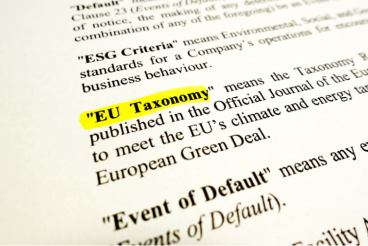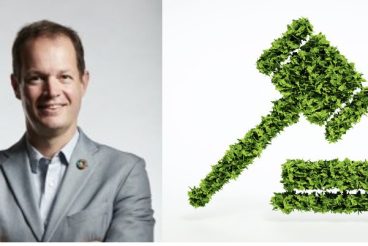This article is from VitalBriefing’s Sustainability Matters content series, in which we speak with experts across every facet of sustainability, ESG, sustainable finance, impact investing and more. If you or a colleague are interested in participating in the series, please get in touch by emailing eschrieberg@vitalbriefing.com.

How fares the EU’s finance industry regarding its sustainability transition? As a global leader in the space, the old continent serves as the model for countries across the globe. But as the EU prepares to introduce the Corporate Sustainability Reporting Directive, some experts worry that transparency remains a key issue — while others warn that the transition is too slow.
In this interview, the first in a two-part series, sustainability reporting expert Richard Howitt — an ex British MEP who has helped organisations across the globe to meet the challenges of sustainable and responsible business — answers our questions and raises some concerns of his own.
HSBC’s head of responsible investment, Stuart Kirk, triggered an outcry not long ago when he said HSBC does not face financial risk from climate change because of the short-term nature of its lending. How would you respond?
Any investor or company believing they can ‘safely’ delay their climate transition risks their own business prospects falling victim to the ‘tragedy of the horizons.’ The higher frequency of floods, heat waves and other extreme weather events as a direct consequence of global warming have already inflicted a ten-to-twelve fold increase in economic costs compared to just twenty years ago.
The oil price hikes we’re experiencing, for instance, may be the start of a wider trend. Consider the inevitability of carbon pricing and likely trade wars in the pursuit of climate adaptation: it could be argued that we are in a ‘carbon bubble’ that could burst at any time, and that would cause greater shock to our economic systems than the dot-com bubble, the Covid pandemic or the 2007/08 global financial crisis.
Kirk is welcome to his opinion, but I believe that no sector is immune to the scale and sheer unpredictability of these risks in the short- or long-term.
Any investor relying on outdated, unsustainable business models simply risks missing out on new market opportunities and, consequently, better rates of return. In fact, according to OECD predictions, these new sustainability-oriented products and services could yield 5% growth in global GDP (if Net Zero is achieved), while the Business and Sustainable Development Commission revealed that realising the UN Sustainable Development Goals could unlock economic opportunities worth at least $12 trillion by 2030.
While I disagree with Kirk’s assertion, I think it’s important to note that I don’t believe they are reflective of HSBC’s stance on the subject. As former Chief Executive of the (then) International Integrated Reporting Council (IIRC), I recall how HSBC had hosted our inaugural meeting in its boardroom. Today, I see the bank committing itself to Net Zero by 2030 and joining the Glasgow Financial Alliance of nearly 200 banks and investors committed to leading the global finance sector’s own ‘Race to Zero’.
What role should regulatory authorities, the United Nations and organisations such as the European Financial Reporting Advisory Group, International Sustainability Standards Board and International Integrated Reporting Council play?

Major changes all have an adoption curve, with regulation coming in at a certain point to stop laggards or ‘free riders’ undercutting the rest. The transition to sustainable business backed by sustainable finance is no different, but the necessary scale and pace of change makes this ever more urgent.
The EU and the International Financial Reporting Standards Foundation are pushing to establish standards for sustainability reporting that are backed by mandate. These initiatives are a crucial next step for businesses to understand their true impact and for capital markets to receive the information they need to allocate the capital required to achieve Net Zero.
The good news is that the directive requiring business to report in adherence to European standards has already been agreed upon in Brussels. Meanwhile, the first global standards from the International Sustainability Standards Board (ISSB) are due to be published by the end of the year. Add these positive updates to new and improved taxonomies that are more effectively defining what is and isn’t genuinely sustainable, and we’re finally getting somewhere.
Ultimately, though, the biggest accelerator will be for individual countries to adopt and enforce these standards as quickly as they can.

Financial institutions complain that their sustainability reporting can only be approximate as long as companies they lend to or invest in fail to possess or transmit relevant data. Is this justified?
Too often have I heard investors blame companies for not providing the data and companies blame investors for not asking for it. This finger-pointing charade has indeed long been a major hurdle for sustainability reporting in finance.
Fortunately, the winds of change have arrived, and this data gap is finally closing.
In the US, for instance, the Strategic Investor Initiative has connected businesses with investors to discuss ESG issues at the highest level in order to forge genuine mutual understanding.
Similarly, the UN-backed Principles for Responsible Investment have brought together nearly 4,000 of the world’s top investors who have committed to hitting interim targets for Net Zero to be reported on by 2025.
Plus, evidence suggests that investors are using third-party credit-rating agencies and increasingly sophisticated modelling mechanisms to asses current ESG ‘gaps’ in company reporting.
Nowadays, a big game-changer is the fact that if companies don’t provide the data they should, they simply risk someone else will do it for them – which means they could potentially end paying a higher price for capital, or miss out on it entirely.
You were among the architects of the EU’s Non-Financial Reporting Directive in 2014. Today the EU is preparing to bring into force the Corporate Sustainability Reporting Directive. Will this represent a breakthrough in terms of transparency? Is it happening fast enough?
I certainly see this shift to the new directive as the next ‘breakthrough moment.’
It’s important to note that the text of Europe’s first legislation for what was then called non-financial reporting – and which I was honoured to help propose and negotiate – had to be less prescriptive and more enabling than the incoming update. At the time, over 90% of companies covered were only just embarking on their sustainability reporting for the first time.
The new directive, meanwhile, can take things to the next level.
The new provisions will increase the scope of the legislation fivefold to cover nearly 50,000 companies. It will also be linked to the mandatory ESG standards, require businesses to undertake climate transition plans, be linked to mandatory human rights due diligence on the company supply chain, and make it obligatory for reports to be subject to independent audit.
This milestone definitely heralds a new sustainability-oriented shift. Whether or not the new directive will be ‘the end of greenwashing,’ as was claimed by its proponents when the agreement was first reached, I’m not so sure. Either way, it’s a sure sign that ESG standardisation will make a difference.
Bringing it back to your question regarding if change is happening fast enough: of course not.
But those of us who are sustainability-reporting advocates have never said that disclosure is the answer on its own. Rather, it’s a necessary part of the jigsaw which will see us transition to a sustainable financial system.
Can this initiative serve as a model to help speed up transparency outside Europe (and in neighbouring countries like the UK)? Is there a risk that other countries critical to a successful energy and climate transition, such as China, India and even the US, will fail to follow?
The EU standards can, and to a certain extent will, serve as a model and guide for the rest of the world. That said, each individual country’s commitment to a sustainability transition will come down to follow-through.
In the US, for example, there is hope. Indeed, this year’s 500-page proposal for climate reporting from the US Securities and Exchange Commission represents another potential huge step forward. Unfortunately, though, my American colleagues in business and investment suggest it may become mired in domestic political differences and disputes.
Looking to the East, there are positive signs. China recently published a voluntary framework of 100 ESG metrics for company reporting which appear to be consistent with the draft global ISSB standards already published. And the country is exploring a common green taxonomy with the EU.
These are, of course, promising moves towards sustainability, but we will have to wait and see how they impact business practices in the country.
India is also beginning to think more seriously about its sustainability journey. I personally contributed to an initiative for sustainability standards with the Delhi-based Centre for Responsible Business.
Closer to Europe, the United Kingdom has committed to implementing the new ISSB global standards. They’ve also already announced their own Sustainability Disclosure Requirements. These, however, are in the form of a ‘roadmap’ rather than legislation.
At the same time, it is important not to underestimate the global reach of the European standards. They can still have major influence considering they will be progressively applied to foreign-owned companies with significant turnover in the EU. They may also be applied in future to many more companies seeking to trade with Europe’s Single Market through an EU Carbon Border Adjustment Mechanism.
I’d say the overall global picture is an optimistic one. How much of my opinion is influenced by the fact that we need to be optimistic if we’re ever to overcome our current sustainability challenges, I can’t say for sure.
— — —
Richard Howitt is Senior Associate at the public interest law firm Frank Bold LLP and Strategic Advisor, Corporate Responsibility and Sustainability, Business and Human Rights. Richard was previously Chief Executive Officer of a forerunner body which is now merged to form the International Sustainability Standards Board and served for 22 years as a Member of the European Parliament, responsible for the EU’s first legislation on corporate sustainability reporting.





